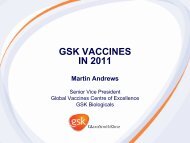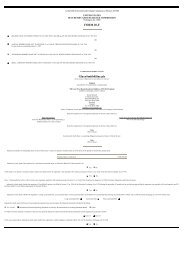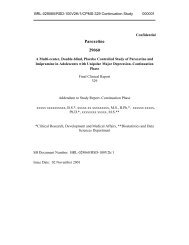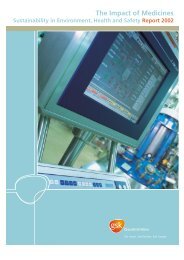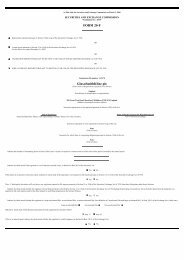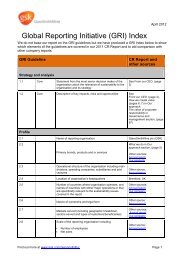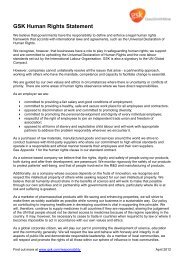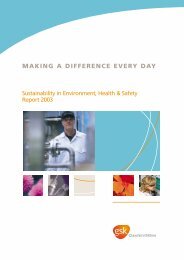GSK Annual Report 2002
GSK Annual Report 2002
GSK Annual Report 2002
Create successful ePaper yourself
Turn your PDF publications into a flip-book with our unique Google optimized e-Paper software.
104 GlaxoSmithKline Notes to the financial statements<br />
30 Legal proceedings continued<br />
In May 2001 Geneva Pharmaceuticals commenced an action in the<br />
US District Court for the Eastern District of Virginia over four<br />
patents recently issued to GlaxoSmithKline covering clavulanic acid,<br />
a key ingredient in Augmentin and Timentin. Geneva asked the<br />
court to declare the new patents, which expire in 2017 and 2018,<br />
invalid. In August 2001 Geneva extended its complaint to cover<br />
three additional patents which expired in <strong>2002</strong>. In September 2001<br />
Teva Pharmaceuticals filed a similar action challenging the four<br />
recently issued patents and a patent expiring in December <strong>2002</strong><br />
that cover Augmentin. In December 2001 Ranbaxy Pharmaceuticals<br />
filed a further action challenging the four patents expiring in 2017<br />
and 2018. The Ranbaxy and Teva actions were consolidated with<br />
the Geneva case. At December 2001 and March <strong>2002</strong> hearings on<br />
Teva’s motions for summary judgement the trial judge held that the<br />
Group’s patents expiring in 2017 and 2018 were invalid. At the<br />
consolidated trial in May <strong>2002</strong>, the same judge ruled that the<br />
patents expiring in <strong>2002</strong> were invalid. The FDA has granted<br />
approval to all three companies and Lek Pharmaceuticals for their<br />
generic products and all four are now marketed in the USA. The<br />
Group continues to believe that its patents are valid and appealed<br />
the District Court decisions to the CAFC. The hearing on the appeal<br />
was heard on 5th March 2003 but as of the date of this report the<br />
CAFC had not yet ruled on the appeal.<br />
In August <strong>2002</strong> the Group commenced proceedings against<br />
Geneva Pharmaceuticals and its parent Novartis AG, Biochemie<br />
GmbH and Biochemie SpA before the US International Trade<br />
Commission and in Colorado state court, alleging that the<br />
manufacture and sale in the USA of Geneva’s generic Augmentin<br />
product using a production strain stolen earlier from<br />
GlaxoSmithKline constitutes misappropriation of the Group’s trade<br />
secrets and unfair competition. Both proceedings seek to prevent<br />
the importation and sale in the USA of generic Augmentin<br />
containing clavulanate made using the stolen GlaxoSmithKline<br />
production strain; the Colorado action seeks damages as well.<br />
Similar state court actions have been initiated against Teva, Lek<br />
and Ranbaxy.<br />
Five distributors of generic pharmaceutical products have filed<br />
ANDAs for sustained release bupropion hydrochloride tablets<br />
(Wellbutrin SR and Zyban) in the USA, accompanied in each case<br />
with a certification of invalidity of the Group’s patents. The Group<br />
has brought suit for patent infringement against each of the filing<br />
parties. The Group filed suit against Andrx Pharmaceuticals, the first<br />
to file an ANDA, in the US District Court for the Southern District of<br />
Florida. In February <strong>2002</strong> the District Court Judge granted Andrx’s<br />
summary judgement motion and ruled that its product does not<br />
infringe the Group’s patents. The Group has appealed that decision<br />
to the CAFC. The oral argument on the appeal was held in<br />
December <strong>2002</strong> but as of the date of this report the CAFC has not<br />
ruled on the appeal. Actions have also been filed against Watson<br />
Pharmaceuticals in the US District Court for the Southern District of<br />
Ohio, Eon Labs Manufacturing in the US District Court for the<br />
Southern District of New York, Impax Laboratories in the US District<br />
Court for the Northern District of California and Excel<br />
Pharmaceuticals in both the US District Court for the District of New<br />
Jersey and the US District Court for the Eastern District of Virginia.<br />
The Watson case has been settled. Judges granted summary<br />
judgement of non-infringement in the Impax and Excel cases, both<br />
of which are on appeal to the CAFC. Summary judgement was<br />
denied to Eon. On Eon’s motion for reconsideration, the judge<br />
confirmed denial of the summary judgement. No trial date has yet<br />
been set in the Eon case. At this point Eon is the only distributor<br />
with tentative FDA approval for its generic version of the product.<br />
The 30-month Hatch-Waxman stay on final FDA approval expires<br />
April 2003 but final FDA approval may also be held up in view of<br />
rights to a 180 day marketing exclusivity that may be held by<br />
Andrx.<br />
The Group filed an action for infringement of its patents for<br />
cefuroxime axetil, the active ingredient in the Group’s Ceftin antiinfective<br />
product, against Ranbaxy Pharmaceuticals in the US District<br />
Court for New Jersey. A preliminary injunction was granted in<br />
favour of the Group but the CAFC subsequently vacated that<br />
injunction and remanded the case to the District Court for a full<br />
trial on the merits. Thereafter Ranbaxy launched its generic version<br />
in March <strong>2002</strong>. The trial is scheduled to begin 8th July 2003. Since<br />
the patent as to which the Group claims infringement expires in<br />
May 2003, the Group now seeks monetary damages based on<br />
Ranbaxy’s sales. The Group has filed a similar action against Apotex,<br />
a second distributor of generic pharmaceutical products, in the US<br />
District Court for the Northern District of Illinois. A preliminary<br />
injunction was granted in favour of the Group in June <strong>2002</strong>. Apotex<br />
subsequently obtained FDA approval for their generic product. The<br />
full trial with Apotex was concluded in January 2003, but as at the<br />
date of this report no decision had been announced.<br />
In August 2001 the Group commenced an action in the US District<br />
Court for the District of New Jersey against Reddy-Cheminor and<br />
Dr. Reddy’s Laboratories, alleging infringement of three patents for<br />
ondansetron, the active ingredient in Zofran tablets. FDA approval<br />
of the ANDA filed by Reddy is stayed until the earlier of January<br />
2004 or resolution of the patent infringement litigation. In March<br />
<strong>2002</strong> the Group filed a similar action against Teva, which alleged<br />
invalidity or non-infringement of two method of use patents but<br />
not the compound patent expiring in 2005, in the US District Court<br />
for the District of Delaware. A trial date of 19th November 2003<br />
has been set for the Teva case. A third ondansetron case, involving<br />
orally disintegrating Zofran tablets, was commenced in February<br />
2003 against Kali Laboratories in the US District Court for the<br />
District of New Jersey.<br />
In August <strong>2002</strong> the Group commenced an action in the US District<br />
Court for the District of New Jersey against Teva, alleging<br />
infringement of the Group’s compound patent for lamotrigine, the<br />
active ingredient in Lamictal oral tablets. That patent expires in July<br />
2008. The defendant has filed an ANDA with the FDA with a<br />
certification of invalidity of the Group’s patent. FDA approval of<br />
that ANDA is stayed until the earlier of January 2005 or resolution<br />
of the patent infringement litigation. The case is in its early stages.<br />
In October <strong>2002</strong> Pfizer Inc. filed an action against Bayer AG and<br />
GlaxoSmithKline in the US District Court for the District of<br />
Delaware, alleging that the manufacture and sale of Levitra<br />
(vardenafil) would infringe a patent newly issued to Pfizer and<br />
asking that Bayer and GlaxoSmithKline be permanently enjoined.<br />
The case is in its early stages.<br />
In January 2003 Cipla and Neolab filed an action in the UK High<br />
Court, seeking revocation of one of the Group’s patents relating to<br />
the asthma treatment Seretide/Advair. This patent, set to expire in<br />
2013, including supplementary protection certificate protection,<br />
relates to the combination of the active ingredients, salmeterol<br />
and fluticasone propionate, on which separate patents exist (which<br />
have not been challenged), providing patent protection in the UK<br />
until late 2005. Several other UK Seretide patents, for example<br />
those relating to the Diskus device and the CFC-free MDI device<br />
which expire in 2011 and 2012 respectively, have not been<br />
challenged. There has been no challenge to the Group’s patents<br />
relating to Seretide/Advair in the USA or in other countries.



